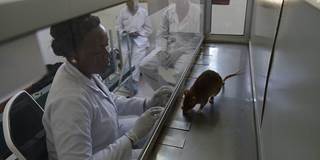From the bombing of hospitals in conflict zones to the outbreak of the Zika virus, 2016 seemed to be one of unrelenting tragedy for global health. But, buried among all of the bad stories, there were some inspiring developments, including innovative diagnostic tools, new vaccines, and more.
HONG KONG – Looking back on 2016, there may not seem to be much to celebrate. In terms of global health alone, the year appeared to be one of unrelenting tragedy. Beyond stories of hospitals in conflict zones being bombed, the Zika virus emerged as a growing threat. There was also the proliferation of antibiotic-resistant microbes, or “superbugs,” the continued revival of yellow fever, and the reemergence of polio in Nigeria, which had previously been declared polio-free. Hopes for a respiratory syncytial virus vaccine were dashed. And in Europe, the incidence of alcohol-related deaths increased.
But, buried among all of the bad stories, there were some inspiring developments in global health in 2016.
The first took place in Tanzania and Mozambique, where African giant pouched rats, which had previously been trained by the Belgian NGO APOPO to detect landmines, were repurposed to help in the fight against tuberculosis (TB). The rats undergo a thorough training process, in which they are introduced to various stimuli, shown how to interact with people, and taught to detect TB in samples of sputum (mucus that is coughed up from the lower airways). The rats can detect TB with almost 100% accuracy, though they cannot distinguish between normal and drug-resistant strains.

HONG KONG – Looking back on 2016, there may not seem to be much to celebrate. In terms of global health alone, the year appeared to be one of unrelenting tragedy. Beyond stories of hospitals in conflict zones being bombed, the Zika virus emerged as a growing threat. There was also the proliferation of antibiotic-resistant microbes, or “superbugs,” the continued revival of yellow fever, and the reemergence of polio in Nigeria, which had previously been declared polio-free. Hopes for a respiratory syncytial virus vaccine were dashed. And in Europe, the incidence of alcohol-related deaths increased.
But, buried among all of the bad stories, there were some inspiring developments in global health in 2016.
The first took place in Tanzania and Mozambique, where African giant pouched rats, which had previously been trained by the Belgian NGO APOPO to detect landmines, were repurposed to help in the fight against tuberculosis (TB). The rats undergo a thorough training process, in which they are introduced to various stimuli, shown how to interact with people, and taught to detect TB in samples of sputum (mucus that is coughed up from the lower airways). The rats can detect TB with almost 100% accuracy, though they cannot distinguish between normal and drug-resistant strains.